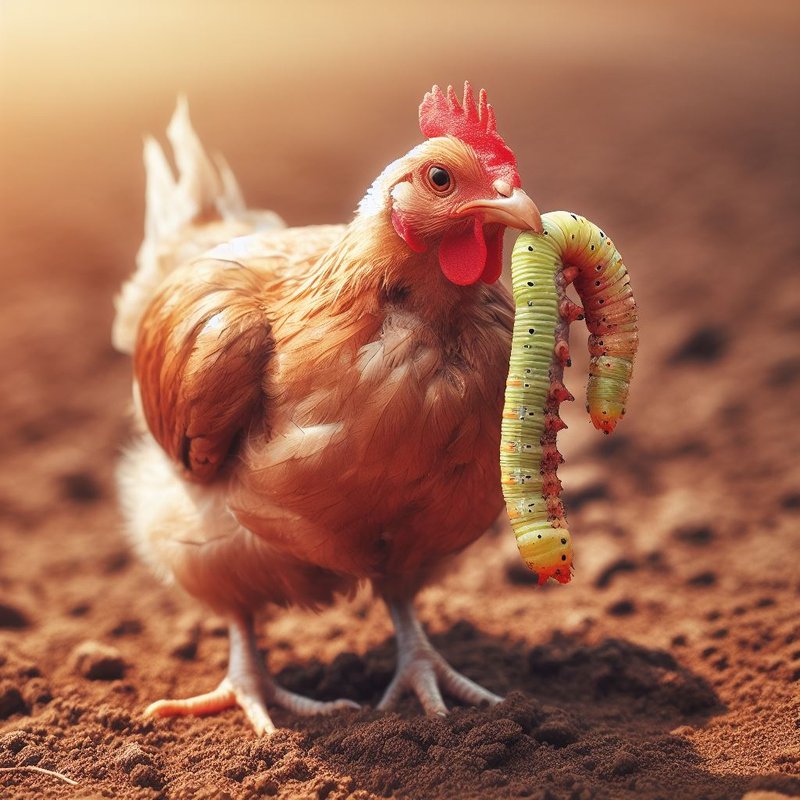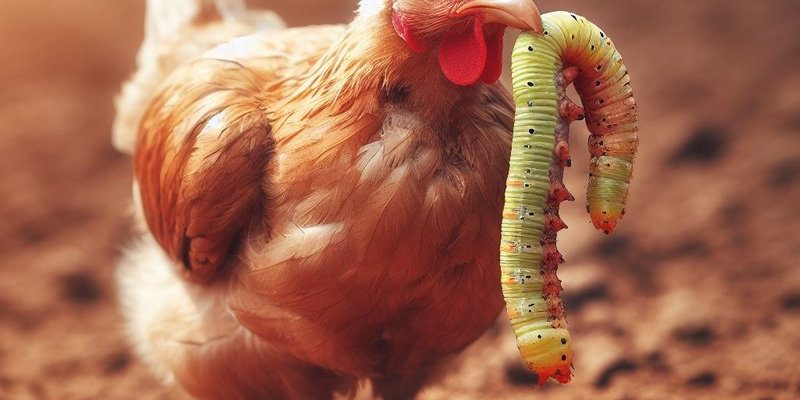
Chickens are naturally curious creatures, and they love to forage for bugs, worms, and all things that wiggle. This means they can be a great, eco-friendly way to help manage hornworm populations without resorting to harsh chemicals. Plus, raising chickens can be a rewarding hobby that gives you fresh eggs and a bit of character to your backyard! Let’s dig deeper into how you can harness the power of chickens in your fight against hornworms.
Understanding Hornworms and Their Impact on Your Garden
Before we dive into how chickens can help, let’s take a moment to understand hornworms. These caterpillars, which belong to the **sphinx moth**, can grow up to 4 inches long, and they have a habit of munching on your beloved tomato and pepper plants. If left unchecked, a few hornworms can quickly turn into a whole army, stripping your plants of their leaves and potentially ruining your harvest.
The best way to identify hornworms is by their bright green color and characteristic “horn” that sticks out from their rear end—hence the name. They usually blend in with the leaves, making them hard to spot at first. Once you do find them, it’s often a race against time. You want to get rid of them before they do serious damage. Here’s where chickens come into play!
How Chickens Can Help Control Hornworm Populations
Chickens are natural foragers, constantly scratching and pecking at the ground in search of tasty treats. When allowed to roam in areas where hornworms are prevalent, they’ll eagerly hunt down and devour these pesky pests. This behavior not only reduces the hornworm population but also helps prevent future infestations. It’s nature’s way of keeping balance, and you get to benefit from their efforts!
Here’s what you can expect when you introduce chickens into your gardening routine:
- Pest Control: Chickens will actively hunt for hornworms, giving your plants a much better chance at survival.
- Soil Health: As they scratch around, chickens help aerate and enrich the soil with their droppings.
- Egg Production: You’ll have a fresh supply of eggs, adding another layer of benefits to your gardening experience.
Let’s not forget, though—chickens can also be a bit of a handful. They’ll eat lots of things, including your seeds and tender seedlings if you’re not careful. So, finding that balance is key.
Creating a Chicken-Friendly Environment
If you’re considering using chickens as a natural pest control method, it’s essential to create a chicken-friendly environment in your yard. Chickens need space to roam, scratch, and peck, and they also need a cozy space to call home. Here are a few tips for setting up your yard:
- Provide Shelter: Build or buy a chicken coop that offers protection from predators and harsh weather. Make sure it has proper ventilation.
- Fenced Areas: If you want to protect specific garden sections, you might want to set up a fenced area so your chickens can roam freely without damaging your plants.
- Roosting Bars: Inside the coop, provide roosting bars where chickens can comfortably perch at night.
Having a safe space ensures your chickens stay healthy and happy, and they’ll be much more effective in controlling those hornworms!
Best Chicken Breeds for Pest Control
Not all chicken breeds are created equal when it comes to pest control. Some breeds have better foraging instincts and are more likely to hunt down hornworms. Here are a few breeds that excel in this area:
- Red Ranger: Known for their strong foraging instincts, these birds are active and efficient pest hunters.
- Leghorn: These chickens are energetic and love to roam, making them great at catching pests in the garden.
- Orpingtons: While they’re known for being calm and friendly, they’re also decent foragers and will help with pest control.
Choosing the right breed can make a difference in the effectiveness of your hornworm control campaign. Plus, they each have unique personalities, so it’s a fun choice too!
How To Introduce Chickens to Your Garden
Introducing chickens into your garden isn’t as simple as letting them loose. Here’s a step-by-step guide to doing it the right way:
1. **Start Small:** Begin by letting your chickens roam in a controlled area of the garden for short periods. This helps them get used to their surroundings and reduces the chance of them munching on your plants.
2. **Supervise Initially:** Keep an eye on your chickens at first. This way, you can gauge how they react to the garden and intervene if they start damaging plants.
3. **Gradually Increase Access:** Once you’re sure they won’t wreak havoc, gradually give them more access to different areas of your garden, especially where hornworms tend to thrive.
4. **Rotate Their Areas:** For the health of both your plants and the chickens, consider rotating their access to different parts of the garden. This gives plants time to recover while still allowing the chickens to forage.
This careful introduction helps you maximize the benefits while minimizing potential damage to your precious plants.
The Benefits of a Chicken-Hornworm Relationship
Using chickens to help control hornworms comes with several perks beyond just pest management. Here are some added benefits of this unique partnership:
- Natural Fertilizer: Chicken droppings are a fantastic source of nitrogen, which can help nourish your garden soil.
- Increased Biodiversity: Introducing chickens can create a more balanced ecosystem, where your plants, pests, and animals interact in a healthier way.
- Gardening Enjoyment: Watching chickens while working in your garden can be incredibly entertaining and satisfying. They each have their quirks and personalities!
Overall, the relationship between chickens and your garden can enrich both your experience and your plants’ health.
Incorporating chickens into your garden as a natural way to control hornworms is not just a clever solution; it’s a way to embrace nature’s helpers. Chickens add life to your garden and promote a healthy ecosystem while providing you with fresh eggs. By creating a friendly environment, choosing the right breed, and carefully introducing them to your space, you can effectively turn the tide on those pesky hornworms.
So, the next time you find yourself battling hornworms, consider letting your chickens take the reins. You might just be surprised at how effective and delightful they can be in keeping your garden flourishing!

